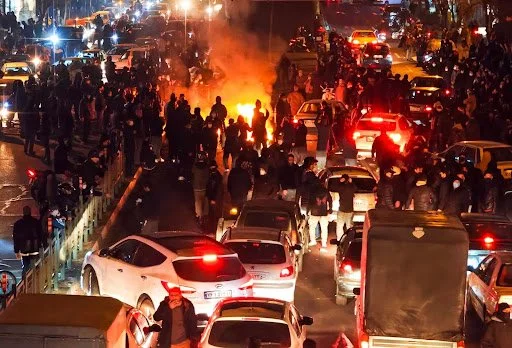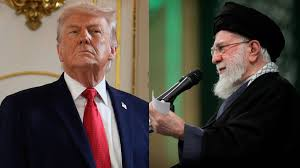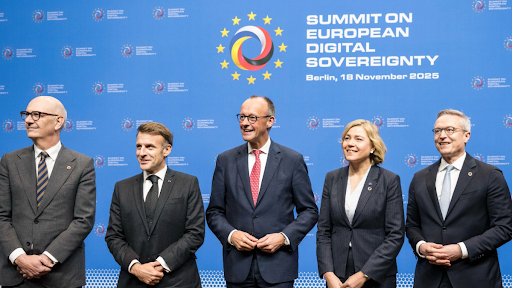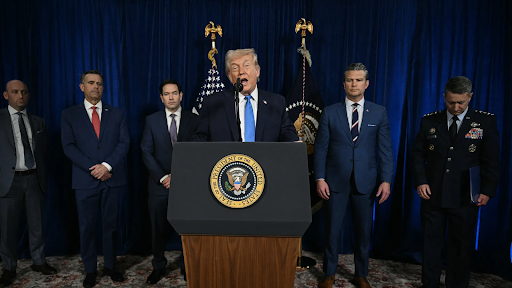Beginning on December 28th, 2025, millions of Iranians gathered nationwide to protest the Islamic Republic government amid the country’s deepest economic crisis in modern history, marked by currency collapse, inflation, and widespread loss of public confidence. In response, the Iranian government imposed a near-total internet blackout and carried out a violent crackdown that left thousands dead or detained, signaling a deliberate turn to mass repression to preserve regime control.
Read MoreIt is no secret that Greenland holds some of the world’s most valuable resources, including oil and copper. In the wake of recent ice melting, the vast natural reserves have caught the eye of the international community. In particular, U.S. President Donald Trump, who seems to have centered his term around Greenland’s acquisition. Much to the dismay of Europe, which now finds its relationship with the U.S. in a tumultuous position, America has entered a new age, one of expansion not from sea to shining sea, but to the Danish-controlled island of Greenland.
Read MoreFor the United States, the coming weeks will therefore be critical in determining whether such diplomacy can decrease or increase tension. For Iran, years of sanctions have negatively affected its economy, resulting in high inflation, a loss of value in currency, reduced oil revenues, and increased unemployment rates. Over the past two decades, the struggling Iranian economy has resulted in a slow population growth, an increase in the average marriage age, and riots across Tehran.
Read More
Big tech companies are now so deeply woven into everyday life that the extent of their power over ordinary people often goes unnoticed. What may have once been a singular calamity is now becoming a growing worry for many European leaders in the wake of a Trump administration with an increasingly brash approach toward the EU.
President Trump’s takeover represents more than just a military victory—it is an unequivocal divergence from the status quo of international relations and a risky foreign policy gamble that is unlikely to end as neatly as it began.
Read MoreOn October 28, Japan’s new Prime Minister Sanae Takaichi and United States President Donald Trump established the United States-Japan Framework For Securing the Supply of Critical Minerals and Rare Earths through Mining and Processing. The framework not only channels billions in joint U.S.–Japan investment to diversify critical mineral supply chains and rebuild high-value industries like magnet manufacturing, but also tightens their political alignment into a more unified bloc that reduces China’s leverage over global technology and security.
Read MoreRussia's late October announcement of successful nuclear weapons tests came days after Trump cancelled the Budapest summit and sanctioned major Russian oil companies. The timing reveals these tests as strategic signaling designed to fracture Western unity on Ukraine while positioning Russia as an indispensable nuclear power that cannot be isolated or ignored.
Read MorePresident Trump has recently authorized a 100% tariff on all foreign-made films. This move raises questions on which films qualify and what effects it could have on both the domestic and international market for American films.
Read MoreThe treaty highlights Australia’s strategic attempts to maintain its influence in a region where China is increasingly active. As Papua New Guinea continues to balance its strategic interests with both hemispheres of the global order, the question of collective security under counteracting power dynamics remains.
Read MoreOn October 4, Japan’s ruling party, the Liberal Democratic Party, elected Sanae Takaichi as its president, putting her on the path to becoming Japan’s next prime minister. During a parliamentary session later this month, leaders are set to confirm Takaichi as Japan’s first female prime minister.
Read MoreOn September 17, American President Donald J. Trump and First Lady Melania Trump were greeted by King Charles III and his consort, Queen Camilla, for an evening of spectacle seldom seen in modern Anglo-American relations. With the ceremonial trappings of royalty in full force, the visit also included a meeting with Prime Minister Keir Starmer, aimed at projecting an image of stability within a recently unstable transatlantic partnership.
Read MorePresident Trump’s administration has escalated its anti-narcotics campaign by authorizing missile strikes against Venezuelan vessels allegedly tied to drug trafficking, invoking new executive powers that classify cartels as “foreign terrorist organizations.” While officials like Secretary of State Marco Rubio argue the strikes were justified under a declared national emergency, critics contend that the administration has blurred the line between law enforcement and military action, raising fears of unchecked executive authority. The operation signals a pivotal shift in U.S. foreign policy, redefining terrorism to include criminal networks and setting a precedent that could expand presidential war powers far beyond traditional threats.
Read More“The Point of No Return: The Disturbing Change in Earth's Oceans” warns that the world’s oceans are undergoing rapid and potentially irreversible change driven by overfishing, pollution, warming temperatures, and acidification. These pressures are collapsing ecosystems, threatening biodiversity, and putting coastal communities and economies at severe risk. Rising seas could displace millions, destroy property values, and strain government resources as entire neighborhoods become uninhabitable. The crisis extends beyond the environment, it's also a social and economic justice issue, as poorer nations will struggle the most to adapt without international aid. While some governments are beginning to respond with resilience and adaptation efforts, global cooperation and stronger policies are urgently needed. This article concludes that although we may be nearing ecological tipping points, humanity still has the chance to act.
Read MoreIn many ways, the United Nations remains humanity’s best-known experiment in collective responsibility. Its next decade will determine whether that experiment still has the power to inspire generations to come, or whether the world will let the scaffolding of cooperation crumble, just when it is needed most.
Read MoreOn Friday, September 26, the United States State Department announced it would cancel Colombian President Gustavo Petro’s visa. This decision came after Petro, who was in New York City for the United Nations General Assembly, participated in a protest against the war in Gaza.
Read MoreThe Trump administration’s hike in H-1B visa fees has ignited debate over America’s approach to foreign hiring and talent. Critics warn it could hurt U.S. competitiveness, while supporters argue it prioritizes domestic workers. The policy has also strained relations with India, highlighting the global stakes of immigration reform.
Read MoreOver the last few weeks, European capitals have been grappling with drone intrusions from Russia. While government officials deliver strongly worded social media statements, Russia denies its deliberate involvement. In the absence of meaningful pushback from NATO, Russia's boldness is expanding.
Read MoreThe Nepalese Gen Z protests were sparked by a social media ban, carried out with the help of social media, and ended with an election held on social media. Whether the ideals of this digitally conceived government will remain reflected in Nepal’s political future remains unknown.
Read MoreChina appears to be moving away from collaborating with the United States on Korean Peninsula stability, instead leveraging North Korea as a strategic buffer to counterbalance deepening ties with Russia and promote a multipolar world resisting U.S. hegemony. The China–North Korea alliance illustrates that economic ties, military developments, and diplomatic positioning are now deeply intertwined, raising the stakes for the U.S. and the international community at large.
Read MoreBurkina Faso, Mali, and Niger announced to the global community that they plan on immediately withdrawing from the International Criminal Court (ICC). These three military-led countries stated that they felt the ICC was an "instrument of neo-colonialist repression.” The ICC has not yet issued an official response, and although these three countries stressed their urgent need to withdraw, the process will take up to a year before it is fully effective.
Read More



















